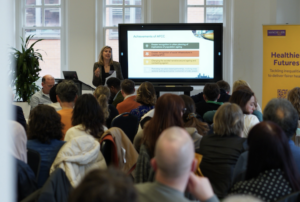Age-Friendly Futures Summit
 The Age-Friendly Futures Summit in Manchester, a landmark event, was delivered in partnership by the University of Manchester, the Centre for Ageing Better, the World Health Organization, the Greater Manchester Combined Authority, and Manchester Metropolitan University. Researchers, policymakers, practitioners, architects, and communities shared cutting-edge research, showcased effective interventions, and set a global agenda for a more age-friendly world.
The Age-Friendly Futures Summit in Manchester, a landmark event, was delivered in partnership by the University of Manchester, the Centre for Ageing Better, the World Health Organization, the Greater Manchester Combined Authority, and Manchester Metropolitan University. Researchers, policymakers, practitioners, architects, and communities shared cutting-edge research, showcased effective interventions, and set a global agenda for a more age-friendly world.
During the plenary session, Professor Tine Buffel, Director, Manchester Urban Ageing Research Group (MUARG), called for society to reframe ageing as an opportunity, emphasising the need to rethink ageing, not as a problem but as a shared opportunity to strengthen communities and create healthier, fairer, and more sustainable cities through collective action. Tine, highlighted Manchester’s leadership: “Deeds, not words. Manchester has never waited for change – it has led it. The Summit is our moment to build on this legacy, push boundaries, and drive bold action for a fairer, more inclusive, and more connected future where people of all ages can thrive.”
MUARG played a key role in shaping the World Health Organisation’s European Strategy on Healthy Ageing by contributing insights and evidence through a series of roundtables designed to inform the programme’s strategic development. This is crucial to drive research and collaboration to improve the experience of ageing and build fairer, more inclusive, and connected cities for all.
In UK’s most deprived areas, people can live up to 19 fewer healthy years than those in affluent localities. By 2050, the global population aged 60+ is predicted to reach 2.1 billion. The Summit called for urgent action to create a more equitable age-friendly future.
Greater Manchester has the UK’s first age-friendly city region, creating environments where all ages can participate in community life, feel respected and included. Initiatives showcased at the Summit included age-friendly benches, co-designed public spaces, cultural events for older adults, and repurposed community hubs for older LGBTQ+ people and ethnically minoritised groups. Tackling inequalities linked to place, gender, class, race, disability, and migration must be central to age-friendly work.
